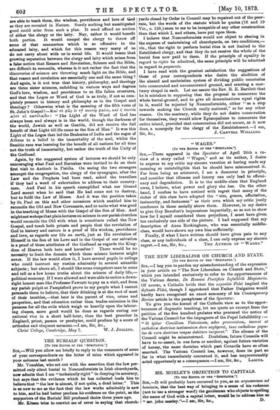THE BURIALS' QUESTION.
[To THB EDITOR. OF THE SPECTATOR.-] SIR,—Will you allow me briefly to reply to the comments of some of your correspondents on the letter of mine which appeared in your columns last month ?
Mr. Venables, who set out with the assertion that the law per- mitted only silent burial to Nonconformists in Irish churchyards, now admits that I am "technically right" in denying its accuracy, but says that the evidence which he has collected leads him to believe that "the law is almost, if not quite, a dead letter." This is as new to me as the fact that the law works admirably is new to him, and he had better produce his evidence on the point, as the supporters of the Burials! Bill produced theirs three years ago.
Mr. Kitson tries to convict me of error in saying that church-
yards closed by Order in Council may be repaired out of the poor- rate, but the words of the statute which he quotes (18 and Vic., c. 128,) seem to me to be incapable of any other construction than that which I, and others, have put upon them.
I believe that Nonconformists would not object to sharing in the expense of maintaining all churchyards, on two conditions,— viz., that the right to perform burial rites is not limited to the Established clergy, and that they do not receive the whole of the burial fees now paid to them. If the principle of equality in regard to rights be admitted, the same principle will be admitted in regard to payments.
I have read with the greatest satisfaction the suggestions of those of your correspondents who desire the abolition of he absurd and unchristian system of dividing public cemeteries into consecrated and unconsecrated ground, and erecting a mor- tuary chapel in each. Let me assure the Rev. R. E. Bartlett that he is mistaken in supposing that the proposal to consecrate the whole burial-ground, and to give all denominations equal rights in it, would be rejected by Nonconformists, either "as a step towards making the Church really national," or for any other reason. On the contrary, while they do not desire consecration for themselves, they would allow Episcopalians to consecrate the entire island, provided that consecration did not secure, as it now does, a monopoly for the clergy of the Establiahment.—I atn,


































 Previous page
Previous page